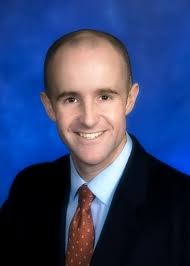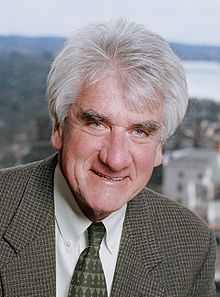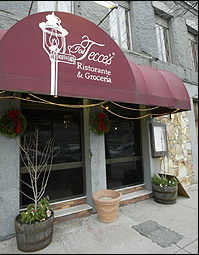By Bill Shein
October 31, 2011
There’s at least one thread that runs through the many-flavored Occupy Wall Street protests: Big money from a narrow economic elite, flowing into and around our political system, has distorted participatory democracy to create an economic system that’s unfair and unjust. Concentration of wealth, historic income and wealth inequality, and forced belt-tightening for working people are hallmarks of our age.

A bill, S.922, filed by State Sen. Ben Downing (D-Pittsfield) at the request of the owners of Cranwell Resort & Spa, would have gutted legal protections for workers that rely on tips.
Those were also hallmarks of the Gilded Age of the late 19th and early 20th century, the time of robber barons, overt political corruption that would lead to Progressive Era reforms, and, here in western Massachusetts, the construction of enormous Berkshires estates.
One of those properties, inhabited by a succession of wealthy owners beginning in the 1850s, is now the luxury Cranwell Resort, Spa, and Golf Club in Lenox.
According to the resort’s website, “Over the years, Cranwell has served as a home to wealthy industrialists, clergy, writers, students, golfers, and culture lovers in Massachusetts … The history of Cranwell is entwined with many stories of the opulent period between 1880 and 1920 that is known as the Gilded Age.”
This month Cranwell is at the center of a story that reveals, very specifically, what’s broken about our political system in what many consider a new Gilded Age. It came to light when conflicting statements from State Sen. Ben Downing (D-Pittsfield), along with information about his fundraising receipts and expenditures that may be related to a campaign for Congress, raised questions about why he filed – and then withdrew – blatantly anti-worker legislation.
According to news reports in the Berkshire Record and Berkshire Eagle, last fall Downing met with the owners of Cranwell Resort and Spa to discuss laws that protect workers who are paid via cash tips and mandatory “service charges” added to customer bills. Downing told The Eagle in an Oct. 18 interview that “Cranwell managers said they were involved in a lawsuit and they didn’t think the tips legislation was fair.”
Fairness – and evidence of substantial wage theft – was at issue when, in June 2007, Cranwell employees filed the class-action lawsuit against Cranwell Management Corp., two real-estate partnerships that own Cranwell, and several corporate officers and Cranwell managers, including company president Daniel Burack and his son Peter.
Workers alleged they were not receiving their share of a 20-percent service charge added to patrons’ bills, or cash tips collected during group functions held at the luxury resort. They also claimed Cranwell managers instructed them to lie to customers about who would receive the gratuities. The suit was settled earlier this month for $7 million, pending final court approval. Cranwell denies any wrongdoing.
Downing said he told Cranwell executives that he wouldn’t do anything connected to the pending lawsuits – “in no way, shape, or form.” But the legislative record, and campaign-finance reports, tell a different story.
Despite admitting in a Sept. 30 interview with The Record that he “didn’t know much about wage and tips laws,” earlier this year, on January 21, 2011, Downing filed S.922, “An act relative to the pooling of tips.” Downing’s six-paragraph bill – for which there were no co-sponsors, and which he quietly withdrew in September after Cranwell reached a preliminary settlement with employees – would have done four things to gut existing tips law.
First, it changed the definition of “employer” under the tipped-employees statute to specifically exclude officers of a corporation. Despite Downing’s suggestion that this change “had nothing to do with the lawsuit,” it is central: Several of Cranwell’s owners were specifically named as defendants. Changing the definition of “employer” would weaken the statute protecting service workers by denying them the right to sue corporate officers personally. Other classes of workers in Massachusetts would continue to have that right.
According to Shannon Liss-Riordan, a leading Boston employment lawyer, current law prevents unscrupulous business owners from hiding assets or taking a corporation into bankruptcy to avoid paying wages owed.
Second, S.922 would have reduced the statute of limitations for some tips-recovery claims from six years to three, making it harder for workers cheated over a long period to get full restitution.
Third, the bill would have removed employer liability – which can result in payment of triple damages – if an undefined “good-faith effort” was made to address employee complaints.
And fourth – and quite remarkably – it would have made all these changes retroactive to September 8, 2004, the last time the tips law was updated, and an apparent effort to undermine at least some of the Cranwell workers’ claims.
In his Sept. 30 interview with The Record, Downing first said the retroactivity clause “never should have been in there; it was a complete drafting error.” But when asked if Cranwell President Daniel Burack – personally liable in a then-pending lawsuit – had requested that language, Downing answered differently, saying, “He very well may have.”
Still unresolved is whether it was a drafting error – one that remained uncorrected for more than eight months, including during a June 9 public hearing on the bill – or language specifically requested, or provided by, the Buracks and Cranwell.

The son of former House Speaker Tip O'Neill, Thomas P. O'Neill III's lobbying shop, O'Neill & Associates, was paid $45,000 by Cranwell during the first six months of 2011 to advance S.922. It was the second-largest retainer paid to O'Neill among its 50 lobbying clients.
In written testimony Downing provided to the Legislature’s Joint Committee on Labor and Workforce Development for its June 9 hearing, he wrote, “While I learned of these confusions with section 152A from a large employer in my district, the clarifications in S.922 will help businesses of all sizes in the hotel, hospitality and service industry, from the local diner to the luxury resort, by providing a clear roadmap of what is expected of them as employers.”
In fact, Downing’s proposed legislation wouldn’t provide a “roadmap” or clarify any “confusion” in existing law. Instead, it would have specifically undermined service workers’ rights by limiting legal exposure for businesses caught diverting tips or automatic charges meant for non-supervisory workers.
Former State Sen. Steven A. Tolman (D-Brighton), who resigned this month after his election as president of the Massachusetts chapter of the AFL-CIO, also provided written testimony for the June 9 hearing. Strongly opposing all three then-pending tips-related bills, including S.922, Tolman wrote, “All three of these bills are unnecessary and would drastically scale back protections to workers.”
According to the Eagle’s Oct. 19 story, “Downing noted that in many aspects, the Massachusetts tips law is weaker than the laws in neighboring states,” and that he was concerned about “differences between federal and state law.” But Liss-Riordan noted in an interview last week that, in fact, “Massachusetts state law is more protective” of tipped workers than in other New England states. She further explained that, in fact, “federal law allows recovery of tips but not mandatory service charges,” which suggests that relying on federal standards could have undermined the bulk of Cranwell employees’ claims.
Once the bill was introduced, Cranwell invested heavily to get it passed. According to state lobbyist-disclosure reports, the resort hired O’Neill and Associates, a powerful Beacon Hill lobbying firm, paying a $45,000 retainer during the first half of 2011. At least seven O’Neill lobbyists, including CEO Thomas P. O’Neill III, then made campaign contributions to Downing. Two of them, Senior Vice President Matthew Irish and O’Neill, specifically registered to lobby in support of S.922.
According to the state’s online lobbying-disclosure database, the resort had never before hired a Beacon Hill lobbyist. Further, the $45,000 it paid O’Neill during the January-to-June reporting period represented the second-largest retainer paid to the lobbying shop among its 50 lobbying clients.

On March 8, Downing raised nearly $16,000 from lobbyists and Beacon Hill insiders at a fundraiser at Joe Tecce's Ristorante in Boston. On that day, Cranwell owners David and Peter Burack each donated the maximum of $500.
The trail of campaign money tells more of the story. On March 8, the day Downing held a campaign fundraiser at Joe Tecce’s restaurant in Boston, Daniel and Peter Burack each gave Downing the maximum allowable contribution of $500. Neither of the Buracks had donated to Downing before.
While the legal effect of the retroactivity clause on a pending lawsuit is unclear, the goal seems clear. Considering Downing’s various explanations – retroactivity was “definitely a drafting error” or Daniel Burack “may very well have” requested it – plus the bill’s employer-friendly changes to the tips law, Cranwell’s sizeable lobbying expense, and the campaign contributions from the Buracks and seven O’Neill lobbyists, it’s difficult to imagine the effort was not intended to undermine what would soon become an expensive settlement.
Importantly, if he “didn’t know a lot about wage and tips laws,” why did Downing file a bill that, if passed, would have a potentially devastating impact on the legal rights of tipped workers in his district while providing enormous financial benefits for Cranwell’s owners?
One reason may be Downing’s plans to run for Congress, possibly as early as next year, and the need to raise large sums for a campaign. According to campaign finance disclosures, Downing’s second-largest expense during the first six months of 2011 was a total of $15,837 paid to 4C Partners, a Washington, D.C. political consulting firm that helps elect Democrats to Congress. The firm’s principals are former employees of the Democratic Congressional Campaign Committee, and in January, Downing began paying the firm a $3,500 monthly fee for “consulting services.”
Interestingly, one minor expense – just $45.44 – was paid to 4C Partners and itemized in campaign-finance disclosures as “Tecce fundraising expense.” Why is a D.C. consulting firm that works on Congressional races helping Downing raise money for his state committee?
The answer appears to be that Downing is using money from his state political committee during what the Federal Election Commission considers a candidate’s “testing-the-waters” phase, a legal gray area that allows him to spend state-raised money on a Congressional campaign without being subject to federal campaign filing and disclosure requirements. (Massachusetts campaign-finance law permits any expenditures related to “enhancement of the political future of the candidate.”)
Because federal law prohibits the transfer of money raised for a state campaign to a U.S. House race, spending money in this manner is useful during the early stages of a campaign. Once declaring as an official candidate for Congress, money in a state campaign account can no longer be used.
While many Berkshire County voters are familiar with Downing’s yearly low-dollar, in-district “Breakfast with Ben” fundraisers, a large portion of his campaign funding now comes from Beacon Hill lobbyists and representatives of corporate interests. In the last election cycle, he raised at least $33,830 from lobbyists and lawyers, twice as much as from any other category of donors, and nearly five times as much as he raised from organized labor, according to the National Institute for State Money in Politics.
Downing will likely far surpass that amount this year and next. His March 8 fundraiser at Joe Tecce’s was attended by dozens of lobbyists and Beacon Hill insiders, including Pittsfield’s former state representative, Peter Larkin, who now lobbies for General Electric. Others who contributed on March 8 are registered lobbyists for a who’s who of big corporate clients, including Exxon Mobil, Bank of America, Visa, Verizon, Kraft Foods, and dozens more.
Thanks, no doubt, to his new position as co-chairman of the Joint Committee on Telecommunications, Utilities and Energy, Downing hauled in $15,849 on that day alone, his biggest one-day take since his 2006 election. During the first six months of 2011, he reported raising $88,814, more than two-thirds of the $123,417 he raised during the entire 2009-10 election cycle, according to the Office of Campaign and Political Finance.
In his Oct. 18 interview with the Eagle reporter, Downing maintained that S.922 “had nothing to do with the [Cranwell] lawsuit. I would never file a bill dealing with a legal proceeding.” But the public record – including the text of the bill, surprising campaign finance and lobbyist disclosures, and Downing’s own conflicting and inaccurate statements – raises serious questions about the veracity of that claim.
The record also suggests that Downing’s fruitful efforts to raise money from Beacon Hill lobbyists, and line up deep-pocketed contributors like Daniel and Peter Burack, perhaps for a future Congressional race, may have, in this case, led to a bill that would have specifically undermined the interests of thousands of working people in western Massachusetts.
—————————–
A version of this story first appeared in the Oct. 28-Nov. 3 Berkshire Record newspaper.
